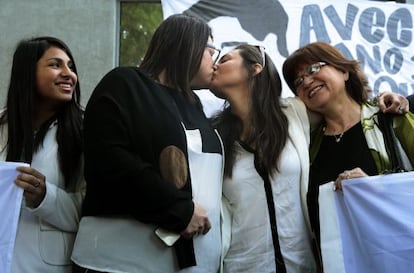Chile grants same-sex couples civil partnership licenses
New law took effect on Thursday following more than a decade of debate over gay marriage

Chile on Thursday became the latest Latin American nation to begin issuing civil union licenses to same-sex couples, putting an end to a more than decade-long debate by lawmakers over whether to allow such legal partnerships to take place.
At 9.02am, Roxana Ortiz, a 38-year-old chef, and her 33-year-old partner Virginia Gómez, who is a nursing student originally from Spain, became the first gay couple to register their civil partnership in the Chilean capital, Santiago.
There was dancing among the crowds outside the civil registry office to celebrate the first ceremonies
Hundreds of people showed up outside the civil registry office, where there was dancing among the crowds to celebrate the first ceremonies.
“This is the end of a battle and I have never been so proud to be Chilean,” Ortiz said.
So far, some 1,500 petitions have been filed with the civil registries for ceremonies up to October 31; 40 percent of those filings are from homosexual couples.
Six months ago, President Michelle Bachelet signed the Agreement on Civil Unions (AUC) law, which took effect on Thursday.
“This is a historic change because the government at last, following many years of exclusion, is recognizing families headed by people of the same sex,” said Luis Larraín, president of Fundación Iguales, which lobbies for social inclusion for gays and lesbians in Chilean society.
Ortiz and Gómez, who live in the Pacific resort town Viña del Mar, met 12 years ago in Spain and got married. When they moved to Chile, they lost all their rights as married partners because gay marriage and same-sex civil unions were not recognized by the government.
“When we arrived as a married Spanish couple, we lost all legal recognition,” explained Gómez, who is from Murcia.
It was especially important for them to legalize their situation because of Roxana’s 14-year-old daughter, whom they are both raising.
“When we came to Chile, things were totally different than in Spain. But in just five years, this country has made some important advances,” she said.
After studying various bills for more than a decade, lawmakers decided to pass the AUC in January, which now allows people of the same sex to legalize their partnerships.
The past conservative government of President Sebastián Piñera (2010-2014) was the first to bring a civil union proposal before Congress. During her re-election campaign Bachelet pledged to push the bill through.
Past President Piñera (2010-2014) was the first to bring a civil union proposal before Congress
Despite Chile being a predominately Catholic nation – divorce was only made official in 2004 and abortion is still illegal – lawmakers went on to approve the AUC following an intense public-awareness campaign launched by Movement for Homosexual Integration and Liberation (Movilh). The organization staged 35 marches and 72 protests and presented six bills for congressional review.
The AUC will also put an end to complex situations that many of the country’s estimated two million non-married partners, in particular homosexuals, had faced in the past.
“There were hundreds of cases where people could not enter hospitals where their partner was suffering because they couldn’t demonstrate any type of relationship, or they were kicked out on the streets because they had no inheritance rights to the house or properties they shared,” explained Larraín.
Before Thursday, homosexual couples from Chile had to travel to other countries, such as Argentina, Mexico, Uruguay, Spain or the United States, to get married. Under the new law, government authorities will recognize these unions from the date they were formalized in other countries.
English version by Martin Delfín.
Tu suscripción se está usando en otro dispositivo
¿Quieres añadir otro usuario a tu suscripción?
Si continúas leyendo en este dispositivo, no se podrá leer en el otro.
FlechaTu suscripción se está usando en otro dispositivo y solo puedes acceder a EL PAÍS desde un dispositivo a la vez.
Si quieres compartir tu cuenta, cambia tu suscripción a la modalidad Premium, así podrás añadir otro usuario. Cada uno accederá con su propia cuenta de email, lo que os permitirá personalizar vuestra experiencia en EL PAÍS.
¿Tienes una suscripción de empresa? Accede aquí para contratar más cuentas.
En el caso de no saber quién está usando tu cuenta, te recomendamos cambiar tu contraseña aquí.
Si decides continuar compartiendo tu cuenta, este mensaje se mostrará en tu dispositivo y en el de la otra persona que está usando tu cuenta de forma indefinida, afectando a tu experiencia de lectura. Puedes consultar aquí los términos y condiciones de la suscripción digital.









































